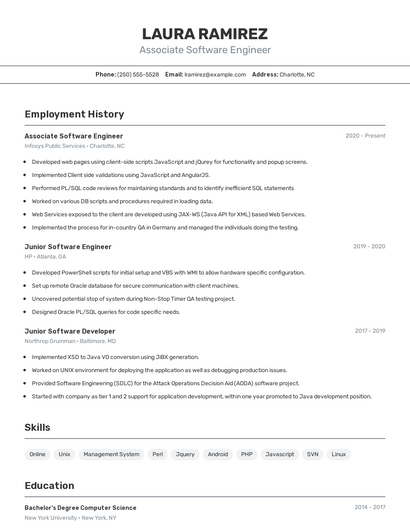
You have many options if you're interested to become a system engineer. You can choose to develop software products or work in other industries. There is a career for you. You should think about the education and work environment you will need as well as your job duties.
Workday for a system software engineering engineer
Workday's software engineer for system software supports thousands upon thousands of servers and network devices. This role requires strong analytical skills and the ability of validating the delivery. Strong communication skills will also be required as the software engineer for system systems will interact with numerous business users and technical groups.
As a systems software engineer, you will develop applications for computer networks and operating systems. You should have extensive knowledge of information technology and computer systems. You should also be able to perform software requirements analysis and adapt to new technical environments. You can work remotely, unlike other IT jobs. A decent salary and other benefits are also possible.

Education Required
You will need to have the right education to be able to work as a system engineer. Computer science degrees are helpful as well as a background in engineering. Your career will be enhanced by a master's level in this field. Further, continuing education can improve your skills and help build your resume. According to the Bureau of Labor Statistics, there are currently 385,200 computer systems software engineers working in the United States. That number is expected increase 22 percent by 2030. This would translate into an additional 409,000.
As a systems engineer, you'll develop software for different departments of an organization. You will also be responsible for researching, designing, installing, and operating computer systems. You could work as a systems software engineer in any number of areas, such as security or gaming systems. End users will need to be understood and software solutions created for them must meet these needs. You should also be proficient in programming languages like C++, Java, and Python.
Duties of the job
Systems software engineers have many responsibilities and duties. Oftentimes, they are the point of contact between the hardware and software teams. They develop specifications and performance criteria for new and existing systems. In addition, they work with a variety of departments and clients to ensure the success of each project. System software engineers work with statistics and data to find the optimal configuration of hardware systems and software. Other responsibilities include consulting managers and other staff on technical issues, and implementing system validation procedures. Aside from communicating key project data to managers and stakeholders they need to be able develop team cohesion.
Senior systems software engineers are responsible for the management of computer network systems and software development teams. This may include overseeing and supervising system developers and other IT personnel as well as integrating new technologies. The senior systems software engineers oversee the software development team. They must be proficient in programming languages and have excellent organizational skills. They must also possess a bachelor's level in a relevant field like computer science, computer engineering, or information technology.

Work environment
System software engineers typically work in offices, writing code and testing it. He or she often works in collaboration with other computer programmers and engineers. They can work together to develop large-scale computer systems or as individuals to create smaller programs. They might work up to forty hours per week, and may be required to work long hours.
This job requires a bachelor’s Degree and requires knowledge of computers and technologies. System software engineers often major in software engineering or computer science. For those seeking an advanced job, a graduate degree may be beneficial.
FAQ
What does it mean to be a consultant?
A consultant is someone who provides services for other people. It's not just a job title; it's a role where you help others achieve what they want from life. By helping people understand their options and helping to make the right decisions, you do this.
Consultants are experts in finding solutions to the problems and challenges that arise while working on projects. They also provide advice and guidance on how to implement those solutions.
Any questions you have about business, technology and finance, leadership or strategy, human resource management, customer service, customer service, or any other topic, a consultant can answer them.
Is it possible to be a consultant?
A consultant is someone who can help you reach your goal by providing advice on ways to make things better, more cost-effective, etc.
Consulting can be a great way to solve problems, make informed decisions, and work with others.
For specific tasks or projects, consultants are often hired.
Consultants are usually paid hourly, daily or per project.
What is the average price you should charge for a consulting job?
It depends on your offering. It doesn't matter if you offer services at no cost. However, if you are selling products or services, then you need to set prices based on value.
If you are offering low-quality services, you don't have much to sell. So why would anyone pay any money for your services.
You might be able ask for a more expensive price if your services are of high quality. People recognize the value in you offering. Also, clients who purchase multiple packages from your company may get discounts.
What can I anticipate from my consultant
After you have selected your consultant, expect to hear from them within a few business days. They will usually ask for information about your company, including its mission, goals, products, services, budget, etc. They will then send you a proposal that outlines the scope of work and estimates timeframe, fees, deliverables, milestones and other details.
If everything looks good, then the two parties will negotiate a written contract. The type relationship between the two sides (e.g. employee-employer or independent contractor-employer) will dictate the terms of the contract.
If everything goes as planned, the consultant may begin to work immediately. The consultant will have full access to your files and resources. You'll also have access to their skills and knowledge.
Don't think that consultants are experts. It takes practice and hard work to become an expert in the field you are consulting. So, don't expect your consultant to know everything about your business.
How do I choose the right consultant?
There are three key factors to be aware of:
-
Experience - How many years of experience is this consultant? Are they a beginner, intermediate, expert, or some other level? Is her resume a proof of her skills and knowledge?
-
Education – What did this person learn at school? Did he/she study any relevant courses after graduating from high school? Were there any evidences of this learning in his/her writing?
-
Personality - Do we like this person? Would we want him/her to work for us?
-
These questions will help us determine if the consultant is right to meet our needs. If the answers are not clear, it may be worthwhile to interview the candidate in person to get more information about them.
Statistics
- My 10 years of experience and 6-step program have helped over 20 clients boost their sales by an average of 33% in 6 months. (consultingsuccess.com)
- WHY choose me: Why your ideal client should choose you (ex: 10 years of experience and 6-week program has helped over 20 clients boost their sales by an average of 33% in 6 months). (consultingsuccess.com)
- According to IBISWorld, revenues in the consulting industry will exceed $261 billion in 2020. (nerdwallet.com)
- 67% of consultants start their consulting businesses after quitting their jobs, while 33% start while they're still at their jobs. (consultingsuccess.com)
- So, if you help your clients increase their sales by 33%, then use a word like “revolution” instead of “increase.” (consultingsuccess.com)
External Links
How To
How do you find the best consultant?
It is important to first ask yourself what you expect from a consultant when searching for one. Before you start looking for someone to work with, it's important that you know your expectations. Before you start looking for a consultant, make a list. This could include: professional expertise and technical skills, project management capabilities, communication skills, availability, etc. After you have outlined your requirements, you might want to ask friends and colleagues for recommendations. Ask your friends and colleagues if they have had bad experiences with consultants in the past. Compare their recommendations with yours. Research online if you don’t already have recommendations. There are many websites, such as LinkedIn, Facebook, Angie's List, Indeed, etc., where people post reviews of their previous work experiences. Consider the ratings and comments of other candidates and use these data to start your search for potential candidates. Once you have a shortlist, be sure to contact potential candidates directly to schedule an interview. At the interview, it is important to discuss your requirements and get their feedback on how they can help. It doesn't matter if they were recommended to your company; all that matters is that they are able to understand your business goals and show how they can help.